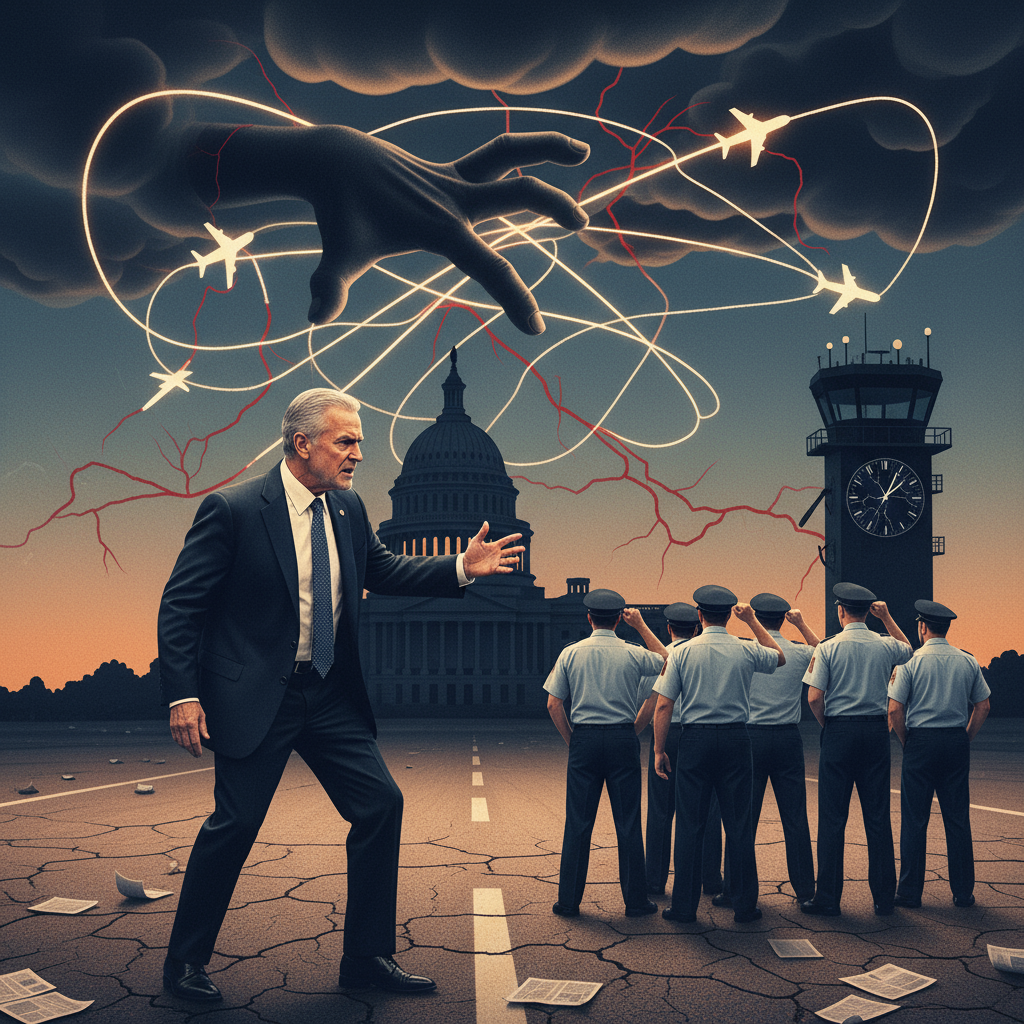When Air Traffic Gets Political: The Sean Duffy Standoff and the Echoes of Shutdowns Past

Imagine a scenario where the skies, usually a symbol of freedom and seamless travel, become a battleground for political brinkmanship and labor disputes. This isn’t a dystopian novel; it’s a stark reminder of the realities faced during government shutdowns, particularly when essential services like air traffic control are caught in the crossfire. The recent headlines resurfacing former Congressman Sean Duffy’s controversial remarks during a past shutdown highlight the persistent tensions between political rhetoric, worker rights, and public safety.
Duffy’s blunt assertion – “When you come to work, you get paid. If you don’t come to work, you don’t get paid” – directed at air traffic controllers experiencing a 10% sick-out, sparked widespread debate. While seemingly straightforward, this statement glosses over the complex human and systemic issues at play. It brings into sharp focus the precarious position of federal employees deemed “essential” during a shutdown: expected to work without pay, under immense pressure, and with their financial stability hanging in the balance.
The Pressure Cooker of Air Traffic Control and the Impact of Shutdowns

Air traffic control is not merely a job; it’s a high-stakes, high-stress profession demanding unwavering focus and precision. Controllers are responsible for the safe and efficient movement of millions of passengers daily, navigating complex airspace, and reacting instantaneously to unforeseen circumstances. Their work environment inherently carries immense responsibility, with no room for error.
During a government shutdown, these essential personnel are placed in an unenviable position. They are mandated to report to duty, often without receiving their paychecks on time. This financial uncertainty creates an unprecedented level of stress, compounding an already demanding role. Imagine trying to guide hundreds of lives through the sky while simultaneously worrying about how to pay your mortgage, feed your family, or cover basic expenses. This isn’t just about showing up; it’s about maintaining peak performance under extreme duress.
The 10% sick-out observed during the shutdown Duffy commented on can be viewed through several lenses. While some might interpret it as a coordinated protest, it’s equally plausible, if not more likely, that it reflects a genuine increase in stress-related illness, burnout, or even a quiet form of civil disobedience born from desperation. When a significant portion of a highly specialized workforce suddenly becomes unavailable, it’s a flashing red light signaling deeper systemic problems, not just individual shirking of duty.
The “Essential” Paradox: Working Without Pay
The concept of “essential” federal employees during a shutdown is a double-edged sword. On one hand, it ensures the continuation of vital services critical to national security and public well-being. On the other hand, it creates a unique and ethically questionable labor situation where employees are compelled to work without the guaranteed compensation fundamental to any employment agreement.
Sean Duffy’s statement, while reflecting a certain economic philosophy, fails to acknowledge this fundamental imbalance. For most Americans, the equation is simple: work equals pay. When that equation is disrupted by political gridlock, it places an unfair burden on those who are least equipped to absorb it – the workers themselves. This isn’t about laziness; it’s about dignity, financial security, and the basic principles of fair labor.
The larger question here is whether it is reasonable or sustainable to expect vital public servants to perform their duties under such economically insecure conditions. The repercussions extend beyond individual hardship, potentially compromising the very safety and efficiency of the services they provide. A stressed, financially distraught air traffic controller is, by definition, a less effective controller, posing potential risks to public safety.
Echoes of the Past, Warnings for the Future
The episode highlighted by Duffy’s comments is not an isolated incident. Government shutdowns have, unfortunately, become a recurring feature of American politics, each time bringing with them renewed anxiety for federal workers and disruptions to public services. The long-term consequences of these repeated events are significant.
Firstly, they erode morale and trust within the federal workforce. Talented individuals may become disincentivized from pursuing careers in government if they perceive their jobs as perpetually vulnerable to political whims. Secondly, they can lead to brain drain, as experienced professionals seek more stable employment in the private sector. Lastly, and perhaps most critically, they highlight the fragility of essential public services when political impasses are prioritized over practical governance.
We’ve seen these narratives play out repeatedly across various agencies during shutdowns, from TSA agents working without pay to national parks being understaffed. The air traffic control situation serves as a particularly potent example due to the immediate and severe safety implications. It underscores the need for a mechanism to insulate essential services and their employees from the disruptive effects of political disagreements.
Conclusion: A Call for Stability and Respect
Sean Duffy’s bold declaration during a federal shutdown serves as a stark reminder of the complexities involved when politics clashes with essential public services. While the principle of “no work, no pay” holds true in many contexts, it loses its ethical grounding when essential employees are forced to work without the guarantee of compensation due to political stalemate. The 10% sick-out among air traffic controllers wasn’t just a statistic; it was a symptom of immense pressure, financial strain, and a system under duress.
Moving forward, it’s imperative to find constructive solutions that protect essential workers from the fallout of political gridlock. This means ensuring stable funding for critical services, respecting the vital role federal employees play, and creating an environment where they can perform their demanding jobs without the added burden of financial insecurity. The safety of our skies and the well-being of those who manage them depend on it.

